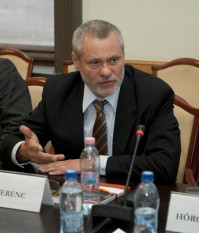
Megjelent Ferenc Bódi, Andrea Ragusa és Ralitsa Savova által szerkesztett "Courage in Politics" című kötet az Pacini kiadó gondozásában.
John F. Kennedy írta a Profiles in Courage munkájában: A nation which has forgotten the quality of courage which in the past has been brought the public life is not as likely to insist upon or reward that quality in its chosen leaders today – and in fact we have forgotten. Valóban a jelenkorban a politikát kevésbé kötjük össze a bátorsággal. A politika pragmatista megközelítése általánosabbá vált, mint annak erkölcsi megítélése. A politika értelmezése inkább a hatalom megszerzés és megtartás technikai részleteire összpontosít, s kevésbé a politikai cselekvő erkölcsi motívumaira. A modernek mondott korban, s annak politikai rendszeriben a döntéshozók elfogadottságát, ismertségét vagy épp taktikai érzékét inkább értékelik, mint azok elszántságát, merészségét, helyes cselekedetét, amely szembe kerül a nép, a tömeg elvárásaival, vállalva azt a személyes veszteséget, amely érheti a pletykák, a népszerűség vesztés, a kirekesztettség, a szégyen által. Ugyan akkor a közelmúlt nagy történelmi fordulataiban is jelentős szerepet kaptak azok a személyiségek, akik a koruk, illetve a környezetük nyomásának ellenállva helyes, morálisan helyes döntéseket hoztak. Sir Winston Churchill és Charles de Gaulle nélkül Európa lehet ma más arcot mutatna. Martin Luther King Jr. nélkül az Egyesült Államok polgárjogi fejlődése talán nem formálódik úgy, ahogy ma ismerjük. De nem csak politikai vezetők, hanem progresszívcsoportok, mozgalmak is bebizonyították a bátorság történelmet formáló erejét. Ez volt 1956-ban Budapesten, 1968-ban Prágában és ilyen volt, a nyolcvanas években, a Szolidaritás Lengyelországban.
A kötetet Andrea Ragusa emlékének ajánlották a szerzők.
-page-001.jpg) Angol nyelvű összefoglaló:
Angol nyelvű összefoglaló:
Political – courage two words when combined signify one of the greatest of human actions, but one that is seldom seen today. Politics has become an arena where pragmatism rather than moral judgment and social justice reigns, where behavior is focused on gaining and retaining power, finding a strategic and tactical advantage, and being accepted. Throughout the ages there have been individuals and groups who have become models of political courage, those who have chosen to follow a moral compass, to strive to redress injustices, to give up self for the good of others. They exemplify and provide standards by which we can measure political courage today and its impact on shaping history more positively. “Courage in Politics” is meant to promote discourse on the topic. It can serve as a platform for different disciplines to engage in an examination of political courage from various perspectives. The chapters in this book do not begin to represent this rich and important area of study, but it is hoped that it is enough to stimulate the reader’s interest.


